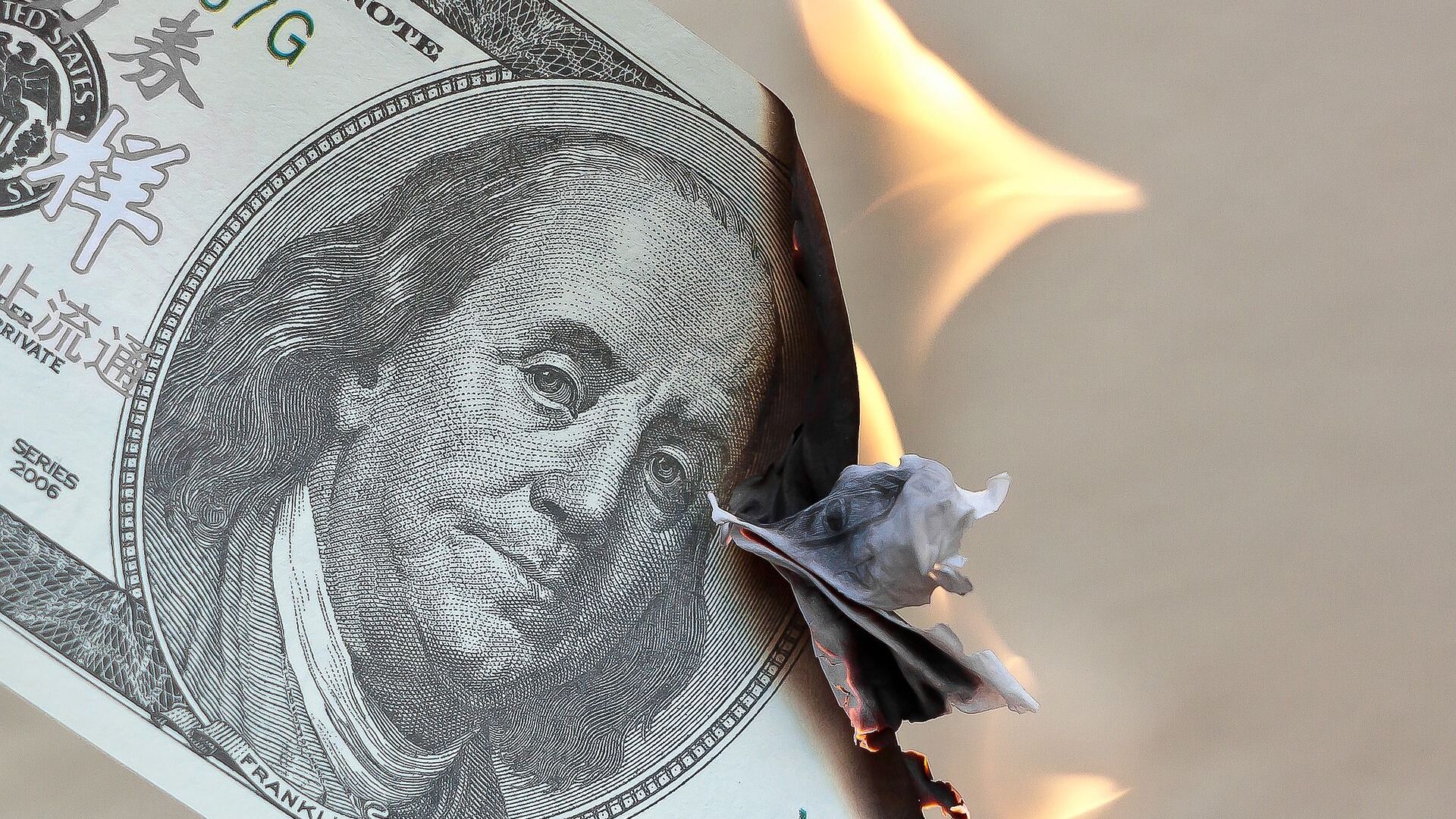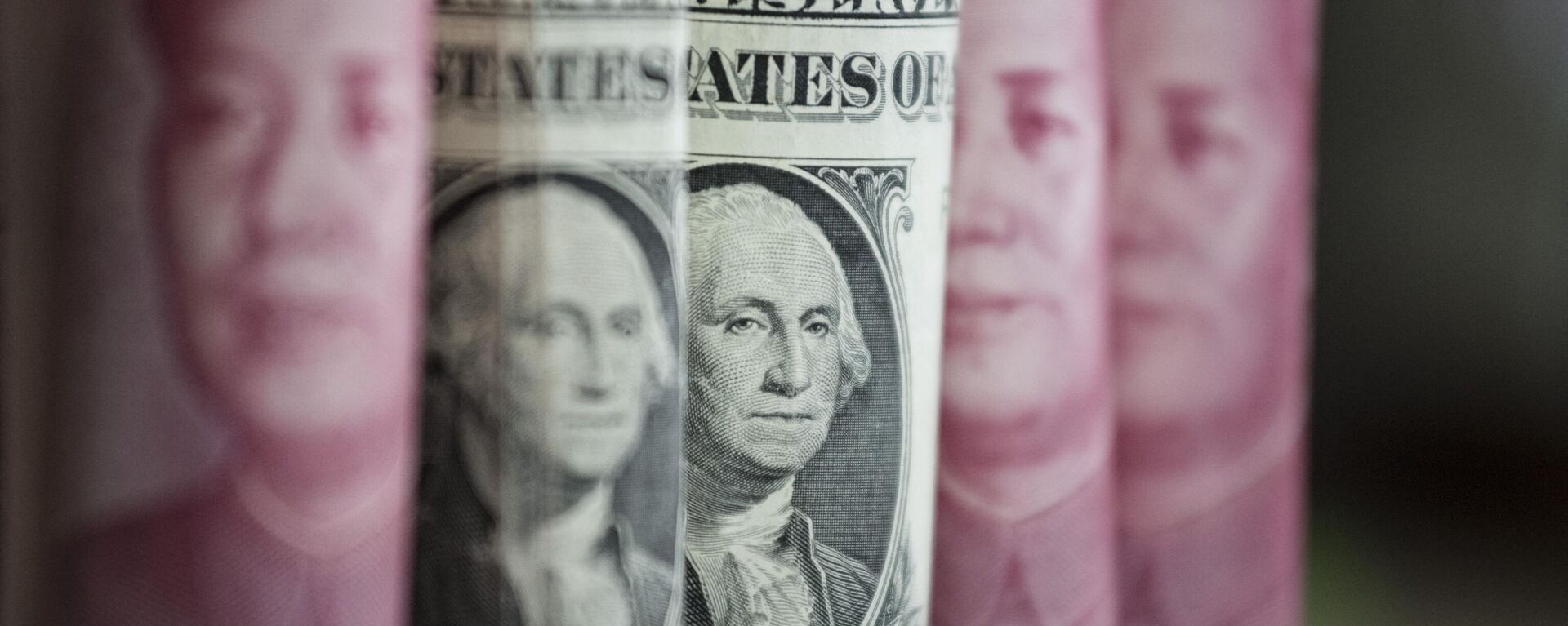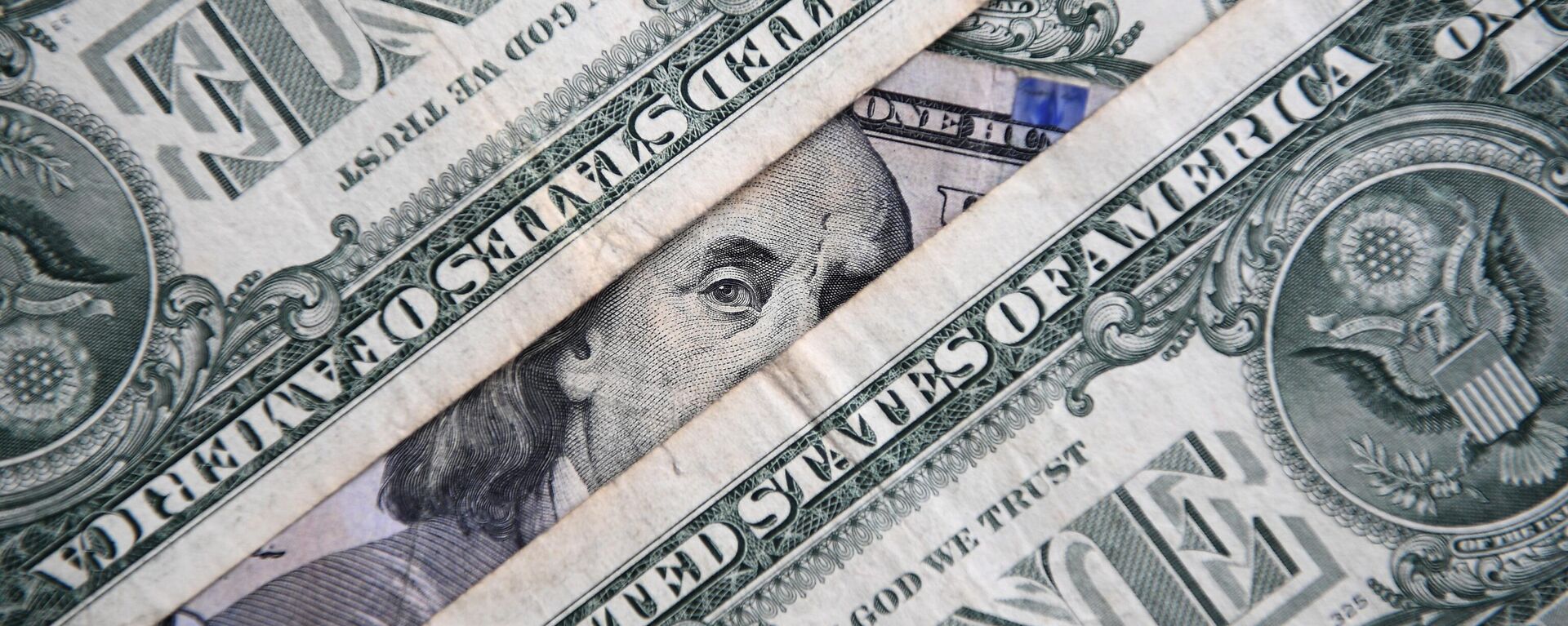https://sputnikglobe.com/20230507/if-china-ditches-dollar-amid-emerging-new-trade-order-consequences-for-us-could-be-stark--1110163827.html
If China Ditches Dollar Amid 'Emerging New Trade Order,' Consequences for US 'Could Be Stark'
If China Ditches Dollar Amid 'Emerging New Trade Order,' Consequences for US 'Could Be Stark'
Sputnik International
If Beijing adandons the US dollar in trade settlements, the United States will be faced with "stark" consequences, a Chinese news outlet has warned.
2023-05-07T10:54+0000
2023-05-07T10:54+0000
2023-05-08T07:39+0000
ditching dollar
dollar trade
dollar
us
yuan
international monetary fund
economy
https://cdn1.img.sputnikglobe.com/img/107963/97/1079639749_0:146:1920:1226_1920x0_80_0_0_7da62549fd722a235b7b615c464dee32.jpg
If Beijing abandons the US dollar in trade settlements, the United States will be faced with "stark" consequences, a Chinese news outlet has warned.Underscoring that a "new trade order is emerging," the report highlighted the global trend of de-dollarization as paving the way for China's currency - the yuan. As the People’s Republic of China boasts the status of one of the world's largest trading countries, if Washington opts to "decouple" from China, this might set off a domino effect, with increasingly more countries preferring to trade with China using the yuan as an exchange currency, it was noted.“We are for de-risking and diversifying, not looking to decouple,” US National Security Advisor Jake Sullivan said at the Brookings Institution in late April, in reference to China’s economy. However, the report underlined that imports of consumer goods by the US plunged 20.6 percent year-on-year in the first three months of this year. If the decline trend continues, it will, in turn, "accelerate the global de-dollarization trend," warned the publication. Meanwhile, the share of the yuan - also referred to as the renminbi - in the Republic of China's cross-border payments shot up to 48 percent in March, data cited by the report showed. Indeed, de-dollarization is becoming a trend, as the world’s reserve currency is fast losing its luster. Moscow has adopted the yuan as a reserve currency, while pledging to use the Chinese means of payment "between Russia and countries of Asia, Africa, and Latin America." China and Brazil recently struck an agreement to carry out trade and financial transactions directly, exchanging yuan for reals.A growing number of countries, especially in the Global South, are parting ways with the US dollar for a batch of reasons. These include the aggressive US sanctions policy targeting countries that it singles out for the purpose. Sanctions on Russia, including the freezing of its Central Bank reserves, severing it from SWIFT, along with restrictions imposed on China's industries have been a wake-up call for many developing nations, with demand for dollars in international transactions falling. Other factors have been America’s swelling federal debt, the volatility of the dollar, a swathe of US bank failures, and more recently, the row over the US debt ceiling. All this has been eroding confidence in the greenback. Aggressive interest rate hikes by the US Federal Reserve have made borrowing in dollars expensive on a global scale. Kristalina Georgieva, International Monetary Fund (IMF) managing director, warned in January 2022 that the US raising interest rates could backfire on the global economy and especially on countries with higher levels of dollar-denominated debt. This year, Georgieva conceded that a shift away from the US dollar was ongoing, albeit there was no "alternative to the dollar" as a world reserve currency in the foreseeable future.
https://sputnikglobe.com/20230503/pepe-escobar-global-de-dollarization-nearing-crossroads-moment-1110062907.html
https://sputnikglobe.com/20230331/not-by-yuan-alone-whole-set-of-national-currencies-to-deep-six-us-dollar-dominance--1109012015.html
Sputnik International
feedback@sputniknews.com
+74956456601
MIA „Rossiya Segodnya“
2023
News
en_EN
Sputnik International
feedback@sputniknews.com
+74956456601
MIA „Rossiya Segodnya“
Sputnik International
feedback@sputniknews.com
+74956456601
MIA „Rossiya Segodnya“
china's yuan, settlement currencies, global trend of de-dollarization, us dollar as reserve currency, dollar losing luster, de-risking, diversifying, decouple, decouple from china, accelerate de-dollarization trend, yuan in cross-border payments, aggressive us sanctions policy, us bank failures, us banking crisis, dollar-denominated debt, america’s swelling federal debt, us debt ceiling, default
china's yuan, settlement currencies, global trend of de-dollarization, us dollar as reserve currency, dollar losing luster, de-risking, diversifying, decouple, decouple from china, accelerate de-dollarization trend, yuan in cross-border payments, aggressive us sanctions policy, us bank failures, us banking crisis, dollar-denominated debt, america’s swelling federal debt, us debt ceiling, default
If China Ditches Dollar Amid 'Emerging New Trade Order,' Consequences for US 'Could Be Stark'
10:54 GMT 07.05.2023 (Updated: 07:39 GMT 08.05.2023) A growing number of countries are opting to diversify settlement currencies, stepping away from only using the "US-weaponized" dollar, or ditching it altogether in favor of the yuan, the increasingly internationalized currency of China – a top trading partner of more than 140 countries.
If Beijing abandons the
US dollar in trade settlements, the United States will be faced with "stark" consequences, a Chinese news outlet has warned.
Underscoring that a "new trade order is emerging," the report highlighted the global trend of de-dollarization as paving the way for China's currency - the yuan. As the People’s Republic of China boasts the status of one of the world's largest trading countries, if Washington opts to "decouple" from China, this might set off a domino effect, with increasingly more countries preferring to trade with China using the yuan as an exchange currency, it was noted.
“
We are for de-risking and diversifying, not looking to decouple,” US National Security Advisor Jake Sullivan said at the Brookings Institution in late April, in reference to China’s economy. However, the report underlined that imports of consumer goods by the US plunged 20.6 percent year-on-year in the first three months of this year. If the
decline trend continues, it will, in turn,
"accelerate the global de-dollarization trend," warned the publication. Meanwhile, the share of the yuan - also referred to as the renminbi - in the Republic of China's cross-border payments shot up to 48 percent in March, data cited by the report showed.
Indeed,
de-dollarization is
becoming a trend, as the world’s reserve currency is fast losing its luster. Moscow has adopted the yuan as a reserve currency, while pledging to use the Chinese means of payment
"between Russia and countries of Asia, Africa, and Latin America." China and Brazil recently struck an agreement to carry out trade and financial transactions directly, exchanging yuan for reals.
A growing number of countries, especially in the Global South, are
parting ways with the US dollar for a batch of reasons. These include the aggressive US sanctions policy targeting countries that it singles out for the purpose. Sanctions on Russia, including the freezing of its Central Bank reserves, severing it from SWIFT, along with restrictions imposed on China's industries have been a wake-up call for many developing nations, with
demand for dollars in international transactions falling. Other factors have been America’s swelling federal debt, the volatility of the dollar, a swathe of US bank failures, and more recently, the row over the US debt ceiling. All this has been eroding confidence in the greenback. Aggressive interest rate hikes by the US Federal Reserve have made borrowing in dollars expensive on a global scale.
Kristalina Georgieva, International Monetary Fund (IMF) managing director, warned in January 2022 that the US raising interest rates
could backfire on the global economy and especially on countries with higher levels of dollar-denominated debt. This year, Georgieva conceded that a
shift away from the US dollar was ongoing, albeit there was no "alternative to the dollar" as a world reserve currency in the foreseeable future.




